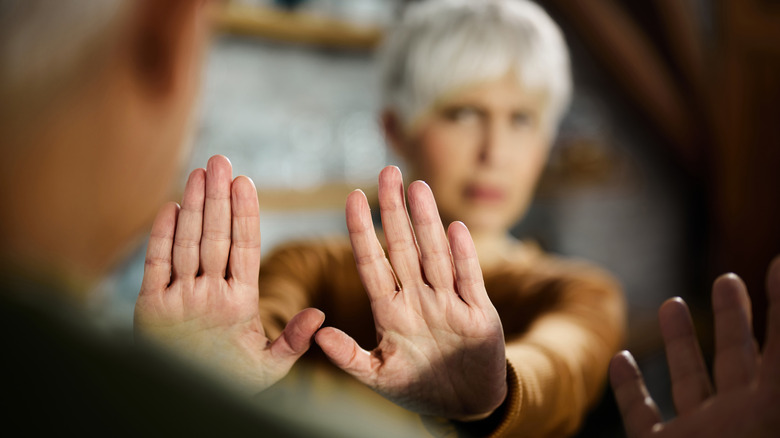Avoid This Common American Gesture At All Costs When Traveling In Greece
Many people think that hand gestures are universal, but you'd be surprised that a simple hand gesture in one place can mean something entirely different in another country or culture. Using hand gestures is quite common; a thumbs up indicates a good job, taking out the middle finger is considered an insult, and many cultures agree to these common notions. Just keep in mind that in some cultures, you should even think twice before smiling, and other popular gestures might be misinterpreted.
In fact, one simple hand gesture, quite commonly used in America, can be extremely insulting and considered rude in Greece. Raising five fingers with the palm facing outwards is what many Americans would consider a simple wave, a stop sign, or even the number five. But this is historically perceived as a rude hand gesture in Greece. There's a long history behind how this hand gesture came to be so offensive in Greek culture, but the good news is it's easy to learn the other gestures which you should use instead.
What is the moutza and why is it deeply insulting?
Extending an open palm with fingers spread towards someone's face is known as the "moutza" or "mountza" in Greece and has a historical reference that dates back to Byzantine times. During this era, criminals were publicly shamed with ashes or feces smeared on their face by an open palm. This hand gesture gradually became a symbolic insult that signifies disgrace and humiliation. Today, the moutza is considered one of the rudest hand gestures in Greek culture and can easily escalate depending on how it is used. For example, raising a one-hand moutza means "shame on you" or "you're a fool." However, using a two-hand moutza is even more aggressive and signifies a much deeper insult. The closer it is used to someone's face, the ruder it becomes.
The moutza is commonly used in traffic disputes, arguments, or when expressing frustration, but it is not something a tourist should ever attempt to use. Because the hand gesture is so common in other cultures, many tourists can accidentally use it when waving hello to a local in Greece or raising your hand for someone to see you. Other tourists might use it as a stop or wait sign to get someone's attention which could instantly be perceived as an insult. And last but not least, a tourist might even be counting or holding up the number five with no intention of being rude.
How to avoid accidentally offending someone in Greece
While it will require some focus, instead of waving and extending the fingers entirely, it is possible to avoid a moutza by slightly bending the fingers. This indicates it is a friendly wave and not intended to be rude at all. When signalling or trying to grab someone's attention in Greece, you can use a thumbs up sign or even just a nod as they are more socially accepted with no risk of being misinterpreted. Another option is to signal with a closed palm or fist to make a stop sign and avoid extending the fingers at all.
If you unintentionally use the moutza and it is taken offensively, politely apologize and explain that it was unintentional. However, it is important to show cultural awareness when visiting a new country, such as avoiding common clothing mistakes, respecting traditions, and avoiding public displays of affection in certain countries, as well as calmly smoothing over any misunderstandings. Just think about it: How would you feel if someone flipped you the finger and then claimed to not know it was offensive? The safest route is always to be cautious of offending anyone on your next trip to Greece.


